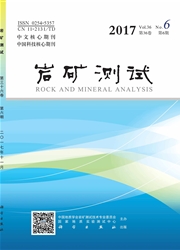

 中文摘要:
中文摘要:
沉积物不同赋存态水作为地球表生过程水岩相互作用的产物,其氢氧同位素组成对于探讨古气候、古环境演变有重要的意义。本文采用热重-真空抽提-液态水同位素测试三者联立技术,提取湖南风化剖面样品不同赋存态水,并测试其氢氧同位素组成。热重分析确立4段抽提温度区间:0-120℃、120-300℃、300-600℃和600-900℃;除120-300℃及300-600℃抽提出的赋存态水性质无法确定外,其余2个温度段赋存态水分别对应吸附水和结构水;0-120℃提取的吸附水主要为现代大气降水的蒸发残余水。由于同位素平衡分馏的原因,赋存态水与矿物晶格结合越紧密,其氢同位素值越偏负,氧同位素值越偏正。本研究方法可为地球表生过程和水循环研究提供依据。
 英文摘要:
英文摘要:
Hydrogen and oxygen isotopic compositions of sediment-bound water,and the product of water-rock interaction,have an important significance to the study of palaeoclimate and palaeoenvironmental evolution. In this study,combined thermogravimetry,vacuum extraction and liquid water isotopic analysis technology are used to extract different sediment-bound water in the weathering profile sediments of hunan,and analyze their hydrogen and oxygen isotopes. Based on the thermogravimetric data,four temperature intervals are determined,0- 120℃,120- 300℃,300- 600℃ and 600- 900℃. The host characteristics of water at the temperature intervals of 120-300℃ and 300- 600℃ cannot be constrained. The water at 0- 120℃ and 600- 900℃ is determined as absorbed water and structural water. The water extracted from 0- 120℃ is termed as absorbed water,which is mainly sourced from atmospheric precipitation after evaporation. As a result of isotopic equilibrium fractionation,the tighter the relationship between sediment-bound water and crystal structure,the more negative the relationship for hydrogen isotopic composition,and the more positive for oxygen isotopic composition. This method can provide valuable information for the study of earth surface processes and hydrological cycles.
 同期刊论文项目
同期刊论文项目
 同项目期刊论文
同项目期刊论文
 期刊信息
期刊信息
